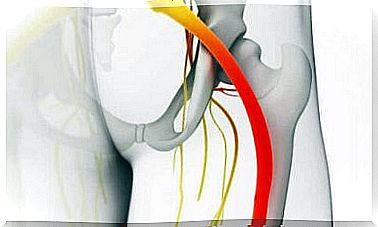Habits That May Lower The Risk Of Dementia

Unlikely as it may seem, interpersonal relationships may be essential to reduce the risk of dementia. Unfortunately, this disease often worsens gradually and eventually affects many brain functions.
However, some habits can help reduce the risk of dementia. In this article you will discover the importance of emotional stability, staying active and improving brain activity.
Dementia
Dementia is characterized by the loss or diminution of certain mental faculties. It mainly affects memory, behavior and reasoning.
Unfortunately, this deterioration is often chronic and progressive. This disease usually manifests itself in the elderly, and patients can eventually become completely dependent. In addition to genetic predisposition, some factors may potentially increase the risk of dementia:
- hypertension
- High Cholesterol
- To smoke
- Diabetes
- Certain forms of depression
- Head injuries resulting in loss of consciousness
- brain disorders
- Exposure to heavy metals, such as mercury
How to reduce the risk of dementia

1. Train your memory
One of the most common symptoms of dementia is memory loss. That is why we recommend that you train your memory every day.
- Think about everything you’ve done every night before going to sleep.
- Another way to train your memory is to pay close attention to each time you visit a new place, do a new activity, or meet someone new. Then repeat everything you have learned and discovered.
2. Improve your skills
There are people who are more interested in numbers. Others, however, prefer words. Regardless of what your interest is, you should do mental exercises to improve your skills.
If you are interested in numbers, doing the very popular Sudoku puzzles is an excellent idea. However, if words are more your thing, then you can read every day.
3. Participate in meetings and debates
Subsequently, all kinds of social activities that involve interacting with other people and different ways of thinking can stimulate the brain and thus help reduce the risk of dementia.
For example, taking part in meetings increases brain activity by exchanging opinions. Arguing and defending an idea puts neurons to work and can reactivate many capacities affected by dementia.
Language, discussions and conversations with friends train your memory, reasoning and brainstorming skills. This is really important because some diseases like Alzheimer’s can affect a person’s ability to learn new information.
4. Seeking Emotional Stability

In addition, it is very important for a patient with dementia to feel the love and understanding of his or her family. Unfortunately, many people find it difficult to cope with their loved one’s degenerative disease. However, emotional stability helps to improve the quality of life of the individual.
For that reason, patient care must be comprehensive. In addition, your physiological, social and emotional needs must be met at all times. Believe it or not, this could potentially help reduce your risk of dementia. If you’re already suffering from it, it can potentially slow down the loss of abilities.
5. Stay active
Finally, another good habit that can help reduce the risk of dementia is physical activity, or rather all kinds of activities that involve both mental and physical health. In general, physical activity can potentially improve cardiovascular health and circulation.
Therefore, an active and lively attitude is the best way to help reduce the risk of this degenerative disease. In this regard, it is a good idea to exercise for at least 30 minutes a day. It is best to do activities that are really hard for you. In addition, you also need to think positively and learn to adapt to changes.









